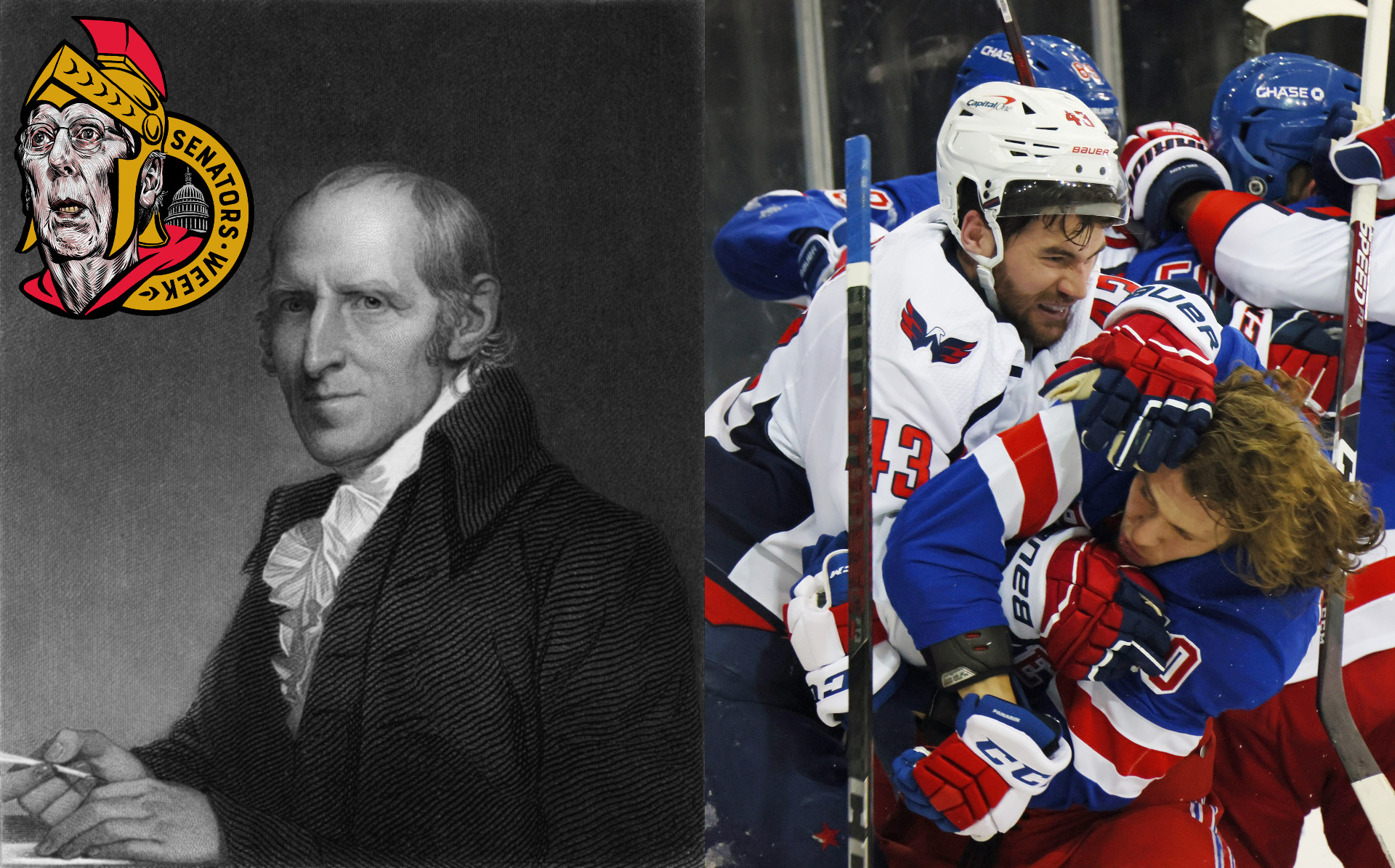One might think that Washington Capitals forward Tom Wilson's conduct on the ice throughout his career is unbecoming of a player whose team makes its home just a mile away from the United States Senate chamber, a famed house of orderly debate and rigidly enforced etiquette. But in fact, one doesn't have to dig deep into the history of America's upper house to find numerous examples of violence, rudeness, and rule-breaking, not unlike those that have defined Wilson's time with the Caps.
On Monday night, in his team's game against the Rangers, Wilson committed yet another breach of on-ice conventions. With his team trailing in the second period, Wilson took advantage of a scrum around his goalie to both punch Rangers winger Pavel Buchnevich in the side of the head as Buchnevich lay face-down on the ice, and toss Artemi Panarin down to the ground during a wrestling match between the two. Panarin will reportedly miss the final three games of the Rangers' regular season due to his injuries from the fall.
Tom Wilson gets a 10-minute misconduct for punching Buchnevich in the head on the ground and body slamming Panarin pic.twitter.com/fg2HRej8yD
— Brady Trettenero (@BradyTrett) May 4, 2021
The Rangers, unsurprisingly, were not shy about condemning Wilson's actions in the postgame.
“There’s lines that can’t be crossed in this game," head coach David Quinn said. "And it’s just, to me, it’s his zero respect for the game in general."
A quickly deleted tweet from the official Capitals account, however, summarized the very different feelings of at least one team employee:

“I thought it was just a scrum," Caps coach Peter Laviolette said when asked for his point of view. "Physical play. There was something going on originally with the goalie and jamming at the goalie. We had a bunch of players jump in there. It happens a lot.”
Wilson would go on to score an empty netter as the Caps won the game 6-3. But this morning, he received news that he would be fined the maximum allowable amount by the league: $5,000. Many fans were shocked that Wilson didn't receive a suspension, especially given his prior history, but ESPN's Emily Kaplan explained that the Department of Player Safety perceived the level of violence much differently than how, say, the New York Post did.
I understand why people are upset/confused over no suspension for Tom Wilson, but here's how the Department of Player Safety saw it..
— Emily Kaplan (@emilymkaplan) May 4, 2021
-The "fall" on Buchnevich isn't much.
-The punch is what Wilson got fined for.
-Everything after? Two guys wrestling, which happens every night. https://t.co/t2HeFFLYPd
For me and many others, the incident calls to mind the Senate's censure of Timothy Pickering of Massachusetts back in 1811. Pickering, a former postmaster general and secretary of state, was the first person to be censured in the Senate's history. According to the legislative body's historical office, he, like Wilson, was a controversial figure who even struggled to maintain good standing with his supposed allies due to his obsessive hatred of the French, who he thought were seeking to undermine American independence.
The Senate Historical Office quotes a biographer as saying that, while a member of the minority party in Congress, Pickering "sensed an opportunity to embarrass the government" and seized on it in late 1810 when President James Madison took possession of West Florida from Spain, claiming it was part of the Louisiana Purchase. However, the Federalist Party senator's attempt at a righteous rebuke only served to further damage his own reputation:
During the December 31 Senate debate about the administration's action, Pickering introduced a letter written by French Foreign Minister Charles Maurice de Talleyrand that President Thomas Jefferson had submitted to the Senate five years earlier. Talleyrand had pointed out that the United States had no legitimate claim to the West Florida region under the Louisiana Purchase. Although Pickering had prepared a long speech, he got no further than reading the minister's letter before Samuel Smith of Maryland interrupted to inquire whether the letter had ever been made public.To his dismay, Pickering realized that he had broken a Senate rule by reading an executive document before the injunction of secrecy had been officially removed. Senate Republicans were delighted to have caught their foe in such an indiscretion. That same day, Kentucky senator Henry Clay introduced a resolution of censure.
Senate Historical Office
Wilson and Pickering's experiences start to diverge, however, after their respective infractions. Wilson's discipline is viewed by the wider hockey world as a mere slap on the wrist, since he will miss no time on the ice, and it furthers the idea that DoPS head George Parros has been reluctant to suspend offenders. While Pickering insisted that he didn't intend to cause harm when he read Talleyrand's letter, Clay argued that he needed to be made an example of in order to prevent further violations of the secrecy rule. Clay's resolution of censure passed 20 to 7, and while censure carries no tangible penalties, Pickering went on to lose his bid for reelection later that year.






